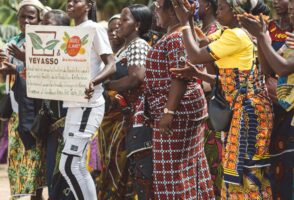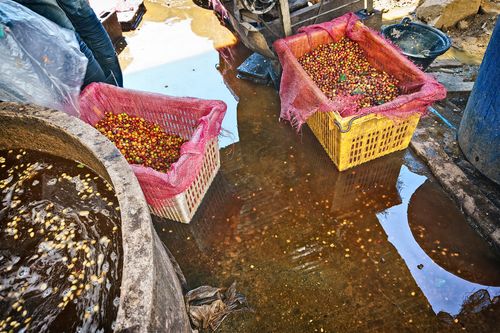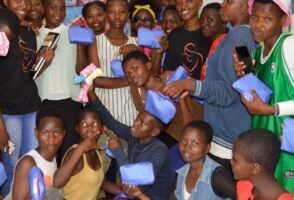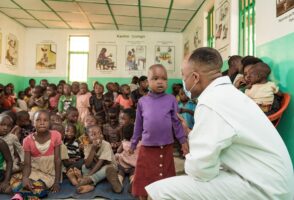
2024
“Yeyasso: the cooperative where all hopes are allowed”
The Yeyasso cocoa and coffee cooperative in the Ivory Coast makes every effort to stay one step ahead of major market trends
Read articleBiologist Zilipa Nyirabyago has just realised her dream: enabling Rwandan coffee producers to receive a stable income by recuperating the tons of waste material generated by washing the coffee cherries and cultivating mushrooms on it.

Zilipa Nyirabyago took off, delighted, for Rwanda and headed for Kigufi, along Lake Kivu, not far from Goma and the neighbouring Republic of Congo. It was there that she set about finalising the last stages of her start-up, Les Moulins du Nil Blanc, which has as its ambition to revolutionise the cultivation of mushrooms, and pleurotes in particular. And her plan is to cultivate them on waste material from the production of coffee, the cultivation of which generates a quarter of all agricultural exports from the country of a thousand hills and… tons of waste.
“Thanks to this project, coffee producers can enjoy a year-round income, not just during the coffee cherry harvest.”
Zilipa Nyirabyago, biologist, mycologist
Zilipa’s project won the prize in the first competition organised by the OVO Acceleration Fund (Ondernemers voor Ondernemers), managed by the King Baudouin Foundation. Thanks to social loans of 18,000 euros awarded by investors brought together by OVO and 12,000 euros from the Acceleration Fund, this trained biologist, who has worked in the food industry and in multinational companies, is realizing her dream: that of enabling coffee producers (who account for over 400,000 of the 12 million people in Rwanda who receive their only income from coffee) to enjoy a year-round income and not just at the moment of the coffee cherry harvest.
“In the Kivu region, coffee farmers derive their income from coffee only once a year, when the beans reach maturity. After they have been washed, tons of cherry pulp and other waste remain from the coffee: in fact, this represents 60% of the weight of the harvest. The project involves, after the coffee cherries have passed through the washing stations, recuperating the pulp and using it as a substrate on which mushrooms can be grown, using good quality spores. And there’s a further advantage: this pulp is also an excellent fertilizer” explains Zilipa Nyirabyago.
Having become an expert mycologist, Zilipa Nyirabyago then multiplied her contacts. She did further training at the Mycelia School in Nevele to learn how to produce the substrate and sell it to small local farmers. She knows all about the mycelium, the vegetative part of a mushroom that enables it to absorb the elements that are key to its survival. She got to know the biologists in Nevele and the owner of Kigali Farms, another mushroom production unit that conducts trials of cultures on strains that live in Rwanda. She also learned how to cultivate pleurotes in Belgium, using coffee grounds or beer distilling dregs at Caffungi in Antwerp and at Champignons de Bruxelles in the Cureghem cellars.
“Did you know that when you drink a cup of coffee, you only take in 0.2% of the original coffee cherry? In Brussels alone, the thousands of tons of coffee that get left in coffee filters every year before ending up in our rubbish could be used to grow shiitakes, the perfumed Asiatic mushrooms that are highly recommended for our health. But that will be for a future phase of my project! For the time being, I’m concentrating on pleurotes. They are also full of medicinal virtues and a wealth of nutrients, which are crucial in Rwanda, where people don’t have enough to eat.”
For two years, Le Moulin du Nil Blanc has been teaching this new technique to local planters. During her last trip to Rwanda, Zilipa Nyirabyago refined the last details to optimise cultivation of her pleurotes, which are as much appreciated by Rwandans as by the rich, foreign clients in the region’s hotels. “The secret of the yield depends on the environment, the humidity, the air temperature and the light… When all of these favourable criteria come together, we can get to work. This type of cultivation has the advantage of requiring very little space, which is an invaluable asset for local producers who only have very small plots of land that are almost exclusively planted with coffee bushes. However, just four square metres enables a farmer to have a profitable production of pleurotes. They just have to put up two or three superimposed shelves to cultivate pleurotes and as soon as he/she has purchased the substrate, all that has to be done is to spread it over these layers, spray them with a little water and it’s done! Two or three weeks later, the harvest can begin. And this process can be repeated throughout the year.”
The cultivation of pleurotes is not only a perfect example of the circular economy, by closing the coffee cycle, it should also enable Rwandan producers to expand their meagre incomes, which are too dependent on the annual ripening of the coffee fruits and world coffee prices. In the meantime, Zilipa Nyirabyago is enjoying the realization of her project. On the border between the Congo and Rwanda, her first clients are already flocking to the market. And in the country of a thousand hills, small producers are learning to master the mystery of the mycelium.
Managed by the King Baudouin Foundation, the OVO Acceleration Fund supports projects in Africa that have a sustainable economic and social impact through loans that are adapted to meet the needs of young local SMEs. The Fund’s donors have the opportunity, unique in Belgium, of converting their tax-deductible donations into investments in profitable projects for African entrepreneurs.

2024
The Yeyasso cocoa and coffee cooperative in the Ivory Coast makes every effort to stay one step ahead of major market trends
Read article
2023
A grant from BPF has dramatically boosted a young entrepreneur’s aim of radically improving the lives of girls and women in Rwanda by producing eco-friendly, reusable, and hygienic sanitary pads.
Read article
2023
One in two children in South Kivu is chronically malnourished. Kesho Congo is developing software to monitor patients more closely and using data research to find solutions to this complex problem.
Read articleTo stay informed about news from our partners and new calls for proposals
Subscribe to the newsletter